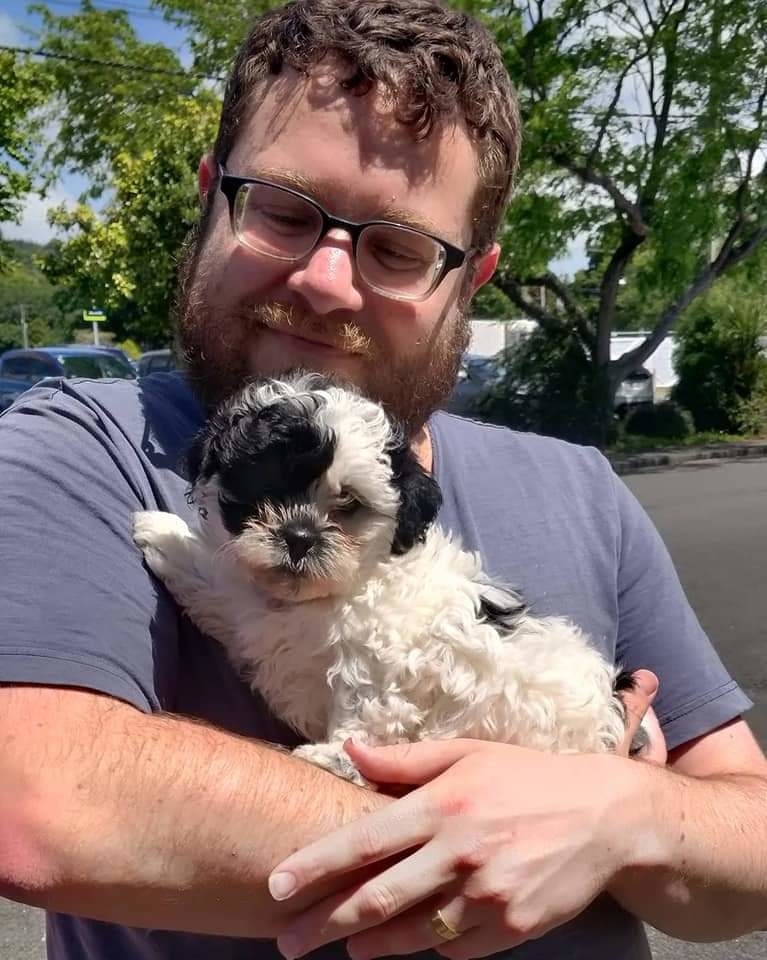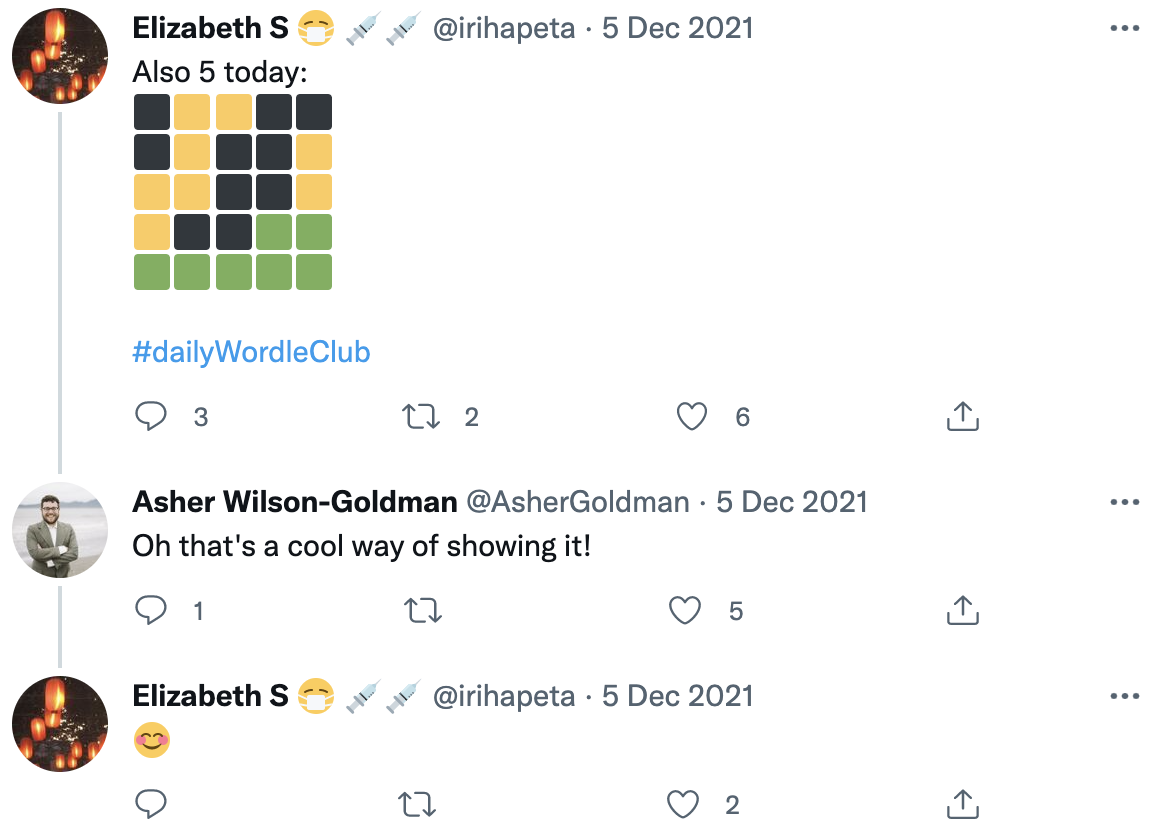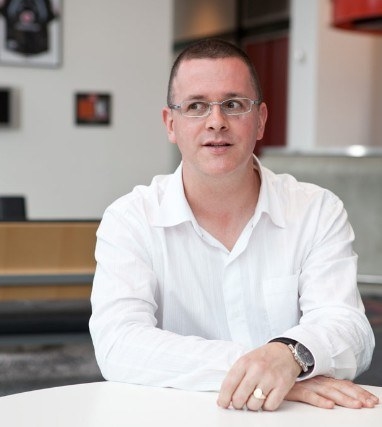
The success of Wordle, the game most easily characterized by the green-and-yellow square emojis that are saturating Twitter feeds worldwide, traces back to a small group of nerdy New Zealanders who were looking for a pandemic distraction.
“The close ties across the country means it isn't hard for things to spread — whether that be gossip, word games, or good public health measures to keep us safe during a pandemic,” said Asher Wilson-Goldman, a public sector communications professional who was one of the first people to start tweeting about the game.
New York software engineer Josh Wardle designed Wordle for his partner. Since November, its daily traffic has skyrocketed from 90 users to 2 million.
Me every morning on Twitter now Wordle 209 X
According to data provided by Twitter, since Wardle released the game in November 2021, there have been 1.7 million tweets mentioning "Wordle" globally. But a Twitter thread from New Zealand in late November really kicked it off.
“Have you been playing Wordle? Like Mastermind (the board game) but for 5-letter words," Kiwi web developer David Ritchie tweeted Nov. 24. “I nailed today's in 3 attempts.”

Andrew Chen, 29, a research fellow at the University of Auckland who helped the government with its COVID-19 contact-tracing app, saw Ritchie’s tweet. “I like logic and word puzzles generally (stuff like Sudoku and escape rooms), and I really liked Mastermind once upon a time. I was hooked straight away,” he told BuzzFeed News.
The premise of Wordle works as such: You have six tries to guess a five-letter word. The game is updated with a new word daily.
So Chen started sharing his results under the thread and comparing them with other mutual connections. Which meant that Paul Brislen, a telecommunications executive in his 50s, took note of his Twitter colleagues talking about five-letter words on his feed. A former journalist himself and self-described “word nerd,” Brislen liked the idea of a pared-down, distraction-free game that forced you to “concentrate and use your brain.”
@dritchie Got it in 3!
Participants followed the golden rule of never tweeting the answer. “That meant there was no feeling of exclusion or being too late to the party,” Brislen said. “I think that was quite important at the start. We were all in it together.”
Wilson-Goldman said he encountered the thread still simmering in this small group of Twitter colleagues. “I think when I joined, there were maybe five or six people already playing through the thread, and I already followed about half of them,” he said.

More of their Kiwi digital friends began sharing results and number of tries under that same thread every day. It began to get a little chaotic with the flurry of messaging, so Kelsy Fletcher, a New Zealand public servant and longtime connection of Chen’s from school, suggested they use a hashtag instead, and #DailyWordleClub was born.
“It felt more like you were indicating that you were part of the club than as a way to collate content,” Chen said.
Even the square emojis came directly from the New Zealand crew. Elizabeth S., an adviser to the New Zealand government, found it would be “much easier” to describe their results using colored emoji tiles for an easy, spoiler-free way of sharing. The format caught on among the #DailyWordleClub members — and then Wardle implemented it in the site’s share option.

“There was some analysis done a while ago that showed the New Zealand Twitter community is more highly interconnected than in other countries,” Chen said. “I mean, we like to say that there's two degrees of separation in New Zealand.”
Google searches for “Wordle” first began spiking in New Zealand around mid-December 2021. This pattern was quickly followed a few days later in Australia after Aussie journalists who follow some of the original New Zealand players saw it and began tweeting. On Dec. 23, Guardian Australia became the first publication to write about it; the outlet embedded six tweets from people playing the game, but only one appeared to belong to someone outside the blue-checked media community.
After the Guardian article, searches began spiking in the United Kingdom and Canada. A New York Times reporter based in London profiled the origins of the game on Jan. 3. Since then, Google searches for the term “wordle” have skyrocketed over fifteenfold.
i don’t know what wordle is because i’ve had sex
The internet has seen similar trends to this before, in which a trend grows from the media’s own personal interest, rather than via organic usage by people who don’t work in media. We saw it happen with “cheugy,” a term resurfaced ironically by TikTok user @webkinzwhore143. The term was pushed into the online zeitgeist after relentless media coverage about it. What began as a casual joke surrounding a teen-fabricated term to highlight millennials’ awkward aesthetic became a widely used word, in part due to media outlets’ immediate gravitation toward it.
Often, it’s been journalists building the Wordle trend, as word lovers who play the game, fall in love with it, tweet about it (often from their blue-checked accounts), and then write stories about it, encouraging others to do the same.
In just under a month, 228 articles have been published about Wordle. Between Jan. 1 and Jan. 13, 1.2 million tweets containing the green-and-yellow square emojis have been sent.
Leading into 2022, the vast majority of tweets around Wordle were coming from New Zealand and Australia — but Twitter shared that the top three countries tweeting about Wordle in recent weeks are the US, the UK, and Canada.
But there’s some indication the game is finally moving to other social networks. Last week, several TikTok accounts dedicated to Wordle were created, where users share their results and post memes.

And the Kiwi crew who started it all are proud of how they helped the game grow.
"I didn't realize we were early adopters; it was just a bunch of people playing a game over summer. But then once the share button was introduced — hats off to Elizabeth for suggesting sharing that way — my Twitter feed is now entirely full of green squares," Brislen said. "I can well understand why some people get angsty about it, as it's gone nuts. But just learn to mute keywords, OK, people?"
Here are some tips, techniques, and opening word suggestions from some of Wordle’s earliest adopters:
Andrew Chen: “I like to use ‘TIMES’ as a starting word because it has an ‘S’ at the end to quickly tell you if it's a plural word or not. I think there is a general consensus that starting words with lots of vowels are good for narrowing down the number of possible words. There's folks out there who have done analyses of the 2,500 words in the Wordle answer dictionary and determined what the ‘best’ starting words are. But I'd like to think that there are no bad starting words, that everyone can have fun whatever way they like.”
Paul Brislen: “My average suggests I need more help than I can give. Usually takes me five guesses to get there, while my wife does them in three. Ugh. Use the ‘FORCE’ (a good five-letter word), try a different starter word each day, remember that what worked yesterday won't tomorrow, and don't forget that double letters are allowed (bloody ‘CLOCK’ ruined my streak).”
Asher Wilson-Goldman: “I use ‘SPELT’ as my opening word and love it. It provides a good range of letters while keeping ‘R’ and ‘A’ spare to provide good follow-up word options. I know a lot of people advocate starting with words with three or four vowels, but I think they're wrong — it's much easier to guess vowels than consonants because there are fewer of them.”
Thomas Beagle: “I like varying my starting words. One day I'm going to get that elusive first-guess winner! My advice is that you don't have to try to get the answer on every guess; sometimes it's better to ignore the letters you've already got and guess a word with five new letters.”
a few months from now there will be a tweet that says "wordle was the banana bread of omicron" and it will have 20k retweets

